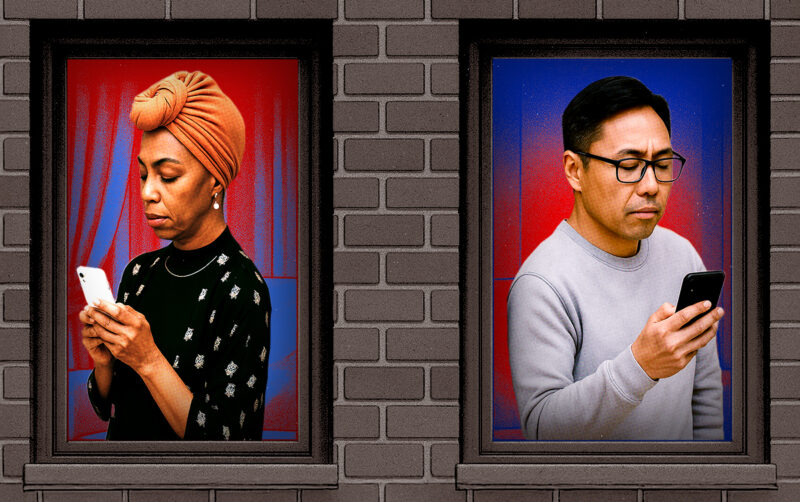Editorial
6 Lessons on Love: How a Democrat and Republican Make It Work
Drew Benbow is a Republican and Sydney Bradford is a Democrat. They met more than twenty years ago as political science majors at Hampton University, and fell in love after reconnecting nearly two years ago. We talked to Drew and Sydney about what makes their relationship work. We’ve got six takeaways that could apply to anyone — whether in love, friendships, or everyday conversations.
Drew and Sydney got some attention last year for opening a bar in Washington, D.C. called Political Pattie’s, which they hoped would foster bipartisan conversation. Opening the bar led to a lot of criticism and anger; some referred to it as “DC’s most hated bar.” It closed in December of 2024, less than three months after opening.
In a Politico piece about the bar’s closing, Drew said what happened to Pattie’s should alarm us. “If you are so offended by the mere sight of a symbol representing the other party that it drives you to anger and vitriol, then that should be concerning.”
After their bar closed, Drew and Sydney created a SuperPAC to promote political civility — the same goal they had with Pattie’s. Drew said, “We’d like to find candidates out there in the country who we are likely to work across the aisle with and pair them up with other candidates of the other party.”
Here are six tips from Drew and Sydney for a strong, lasting relationship across political differences.
1. Focus on the Person, Not Their Politics
Political identity is just one aspect of a person: it doesn’t define their entire character.
“When it comes to matters of the heart, I believe that you should focus on the core of who a person is outside of the political affiliation,” Sydney explains. “Where they fall in the political spectrum is just so much less important than… whether or not they have ethics that align with yours.”
Drew adds, “We see the humanity in each other. We see the fact that we love each other and we put the person above the politics, all the way, all the time.
2. Approach Differences as an Opportunity to Learn
Drew and Sydney view their political differences as opportunities for growth.
“Every time we come to an impasse, intellectually, politically, we use that as an opportunity to learn more,” Drew says. “Sometimes her arguments are better, and sometimes mine are better… But we always take that as an opportunity to learn about each other.”
Sydney echoes this sentiment: “The greatest challenge can often be your greatest asset. So in that respect, we find a lot of value in the way we think about things differently.”
3. Keep an Open Mind — And Listen
One key to navigating political differences is a willingness to listen without immediately challenging the other person.
“I say keep an open mind and listen. Sometimes you just have to hear that perspective without challenging,” Drew advises.
Sydney adds that staying informed and open to new information is crucial: “Sometimes staying true to your beliefs means learning new data and staying smart on an issue.”
But Drew also emphasizes that, as we listen, it’s also okay to have an opinion: “It’s okay to have a perspective. Don’t ever let someone tell you that it’s not okay because it’s okay. That’s the whole basis of our democracy.”
4. Find Common Ground First
For new relationships where both people see potential, focus first on shared interests.
“If you agree on sports, start there. If you agree on the fact that you both hate traffic tickets, start there,” Drew says. Building on commonalities creates a stronger foundation for discussing differences later.
This strategy works beyond romantic relationships. It’s a great way to have more productive and respectful conversations with anyone who sees the world differently.
5. Replace ‘Deal-Breaking’ with ‘Deal-Making’
When asked if any political beliefs could be a dealbreaker in their relationship, Drew has a different perspective: “I don’t think in terms of deal-breaking, I think in terms of deal-making.”
Focusing on intentions can make things more clear. This is why Drew says, “I don’t believe that there’s anything that is a deal breaker for us.”
Sydney agrees: “I don’t think of things in terms of a potential political deal breaker, but instead opportunities to grow and to build on our relationship.”
6. Connection First, Politics Second
“I had the benefit of falling in love before even knowing Drew’s political affiliation,” Sydney shares. The secret is not letting yourself be so worried about their political views aligning with your own but “instead focusing on the person and who they are and what they mean to you.”
Drew adds, “The secret is always remembering why you fell in love with that person in the first place. If you put humanity first, politics won’t come between you.”
This can be the area that makes or breaks a relationship. Contempt is a relationship killer, whether related to politics or something else. Relationship therapist Anita Chlipala says it may be time to consider ending a relationship if you feel “your partner has contempt toward you, and they are unwilling to accept your perspective.”
The unfortunate thing about our political divides is that they can easily lead to contempt. When it’s hard to understand the “other side” and when the stakes seem so high, it’s easy to be sucked into disdain and contempt. Keeping the humanity of your partner in mind is key to avoiding such pitfalls.
Lessons for America?
Sydney and Drew’s relationship offers a lesson for a deeply divided country: it is possible to coexist, even with significant differences.
Understanding each other doesn’t mean agreeing on everything. It means having the patience, respect, and curiosity to truly listen. And that’s something we could all use more of — whether in love, politics, or life.
Drew says, “We think the world can learn from bipartisan couples like us that it’s possible and that it’s worth it… and it’s an unbelievable amount of fun as well.”
Follow Drew and Sydney on Instagram: @drewbenbow | @sydcbradford | @pattiesdc
Join the Builders Movement! buildersmovement.org/invite
Keep Reading

How Politics & Social Media Fuel the Gender Divide

Bias Watch: Is Trump Bringing Back Asbestos?
